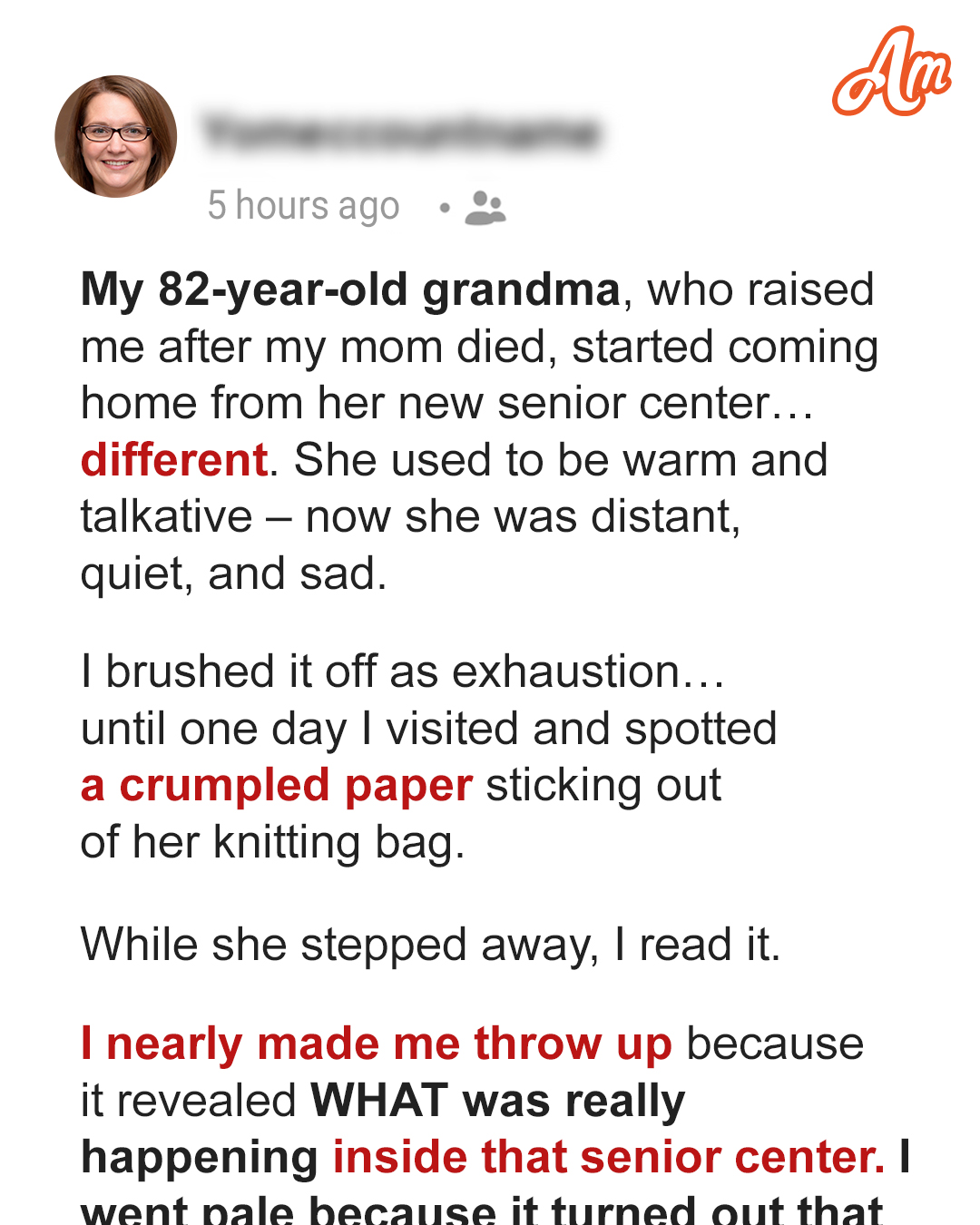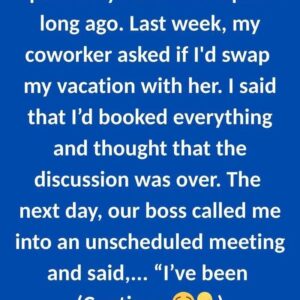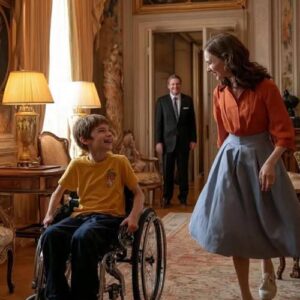
I thought I did the right thing by signing my Grandma up for a senior center that seemed safe, warm, and friendly. But weeks later, she seemed unusually sad and she even stopped calling. Something felt off. When I looked into it, what I found at that center chilled me to the core.
My name’s Abigail, but everyone calls me Abby. I’m 28 and I live just 10 minutes from Grandma Rosie, the woman who raised me after my mom passed when I was six. Grandma Rosie isn’t just family… she’s my anchor, history, and my home.
We talked every night unless one of us was in the ER. Grandma taught me how to ride a bike, braid my own hair, and check my car’s oil. She’s sharp, proud, and talkative… which is why I didn’t worry much when she started going to the new senior center nearby.
She was excited and said the building smelled like fresh lemon and the staff smiled with their eyes. They had jazz nights and craft sessions, even a tai chi instructor named Chuck who she said was “weirdly limber for 70.”
But after a few weeks, she got… quiet.
Not the tired quiet. Not that “I’m old and my back hurts” kind. It was like she’d pulled a curtain around herself.
“I’m fine,” she’d say when I asked about her day.
“How’s Chuck?” I once joked.
“Fine.”
“Did you win bingo again?”
“I didn’t play.”
Then silence.
At first, I chalked it up to a bad day. Then it turned into a bad week. Then she stopped calling me back. I knew something was terribly wrong during another visit.
“Grandma, I brought your favorite blueberry muffins,” I called out, letting myself in with the key she’d given me years ago. The house was quiet except for the ticking of that vintage clock in the hallway.
I found her sitting by the window, folding her sweaters. Her shoulders were hunched, making her look smaller than her already petite frame.
“You’re wasting gas driving over here all the time,” she said without looking up. Her voice had an edge I’d never heard before. “You shouldn’t bother.”
I set the muffins down and knelt beside her chair. “Since when is spending time with my favorite person bothering?”
She finally looked at me, her eyes cloudy with something I couldn’t name. “Since I became a burden. Old people are just baggage, waiting to be stored away.”
My heart raced. “WHO told you THAT?”
She shrugged and went back to folding. “Nobody needs to tell me what I can see with my own eyes.”
I watched her hands—once strong enough to knead bread for an entire church gathering, now trembling slightly as they smoothed the sweaters.
“Remember how you used to love telling me about your friends at the new senior center? You haven’t mentioned them lately, Grandma.”
“It’s fine. Everything’s fine.”
But it wasn’t fine. Not even close.
“Did something happen there?”
“You have your own life, Abby. Don’t waste it worrying about an old woman who’ll be forgotten soon enough.”
Those words didn’t sound like her at all. My grandmother was the woman who once told a door-to-door salesman he had the persuasive skills of a wet newspaper. She didn’t do self-pity.
“I could never forget you, Grandma. You’re the reason I even know how to be a person.”
She patted my hand, but the smile didn’t reach her eyes. “Would you still come around if I had nothing to leave you? If this house and everything in it disappeared tomorrow?”
I went still. “Grandma, what are you talking about? I don’t care about…”
“I need to rest now,” she interrupted, suddenly looking exhausted. “Just leave the muffins in the kitchen.”
After she retreated to her room, I noticed a corner of crumpled paper peeking out from her knitting bag. I shouldn’t have snooped, but something felt wrong. So I pulled it out, unfolded it, and froze as I began reading the words:
“They only visit because they want what you have. Test them. Stop giving, and watch them disappear.”
The handwriting wasn’t Grandma’s. I knew her loopy script by heart. This was someone else’s. I rummaged deeper and found another crumpled note tucked under her prayer book:
“Would they leave you alone if you mattered?”
My hands shook as I carefully returned everything exactly as I’d found it. Someone was poisoning my grandmother’s mind, and I had a sinking feeling I knew where it was coming from.
“I love you,” I whispered at her bedroom door before leaving. She didn’t answer.
The Sunshine Senior Center lived up to its name on the outside—cheerful yellow paint, flowers in window boxes, and a welcoming rocking chair porch. I researched for weeks before suggesting it to Grandma. It had stellar reviews and a calendar packed with activities she’d enjoy.
“I’m here to pick up my grandma, Rosie,” I told the receptionist, while scanning the large common room. About 20 seniors were gathered in small groups, some playing cards and the others working on crafts.
“She should be finishing up the knitting circle. Feel free to wait over there,” the woman said, pointing to a small seating area.
Instead, I edged along the wall, pretending to study the activity calendar while watching the interactions. That’s when I spotted a woman with wavy brown hair, dressed in a white shirt, and leaning in close to an elderly man.
Something about her body language set off alarms… the way she touched his arm and the conspiratorial tilt of her head.
When she finished speaking, the man’s shoulders slumped. She patted his hand and moved on to another table where three women sat, including my grandmother.
I couldn’t hear what she was saying, but I watched Grandma’s face fall as the woman whispered something while passing behind her chair.
“That’s Claire,” said a voice beside me. I turned to find an older staff member. “She’s been volunteering here for about three months now. She’s so dedicated… and shows up almost every day.”
“Does she have a relative here?”
“No, just passionate about seniors. Says they’re society’s forgotten treasures. Isn’t that lovely?”
“Fascinating,” I murmured, while mentally cataloging everything about Claire. Mid-40s. Expensive watch. Perfect posture. And that predatory smile.
When Grandma spotted me, she hurriedly put away her knitting. Claire followed her gaze, and for just a second, her pleasant expression faltered when she saw me.
“Ready to go, Grandma?”
“Yes.”
As we walked out, I felt Claire’s eyes burning into my back.
***
“Tell me about Claire,” I said that evening as I served Grandma the chicken soup I made.
Her spoon clattered against the bowl. “What about her?”
“Just curious. She seems very… involved at the center.”
Grandma stared into her soup. “She understands things. About getting old. About being alone.”
“You’re not alone, Grandma.”
“Not yet. But Claire says that’s how it always goes. First, the visits get shorter. Then fewer. Then holidays only. Then… nothing.”
I reached across the table and took her hand. “That will never happen with us.”
“She says that’s what everyone thinks at first.” Grandma pulled her hand away. “She’s seen it hundreds of times.”
“Has Claire been asking you about personal things? About the house, or money…?”
“She’s just being helpful. She offered to look over some of my papers. Legal things I wouldn’t understand.”
“What kind of legal things?”
“Just… things. For the future. She cares about what happens to me.”
“And I don’t?”
“You’re young. You have your whole life ahead. Claire says—”
“I don’t care what Claire says,” I interrupted, then immediately regretted my tone when I saw Grandma flinch. More gently, I added, “I care what YOU think. And I’m worried about these rotten ideas someone’s putting in your head.”
“No one’s putting anything in my head. I’m not senile.”
“I never said you were. But these notes I found—”
Her face paled. “You went through my things?”
“I’m sorry, but I was worried. Those horrible messages saying nobody cares about you… that’s not true.”
She pushed away from the table. “I think you should go.”
“Grandma, please—”
“Now. I need to think.”
I left, but not before pressing a kiss to her forehead and whispering, “I love you more than anything in this world.”
She didn’t say it back.
The next day, I called in sick to work and did some digging. Three hours and many social media searches later, I found what I was looking for—a post on a local community forum along with Claire’s photo from six months ago:
“Warning to families with elderly relatives at Pine Grove Senior Center. Woman named Claire has been ‘befriending’ isolated seniors, convincing them their families are after their money. My mother changed her will after only knowing this woman for two months. Be careful.”
I found similar warnings from two other towns within a 50-mile radius, dating back two years. Same pattern, different centers.
By afternoon, I compiled enough information to take to the center’s director. But first, I needed to talk to Grandma. I drove to her house with a box of old photo albums—our ultimate comfort activity on bad days.
When she opened the door, she looked exhausted.
“Can we talk?”
She stepped aside.
We sat at the kitchen table where she’d once taught me to roll pie crust, dried my tears after my first heartbreak, and where we’d sorted through Mom’s things after the funeral.
“Remember this?” I opened the first album to a picture of us at the beach, me missing my front teeth and her laughing as I buried her legs in the sand.
She touched the photo gently. “You were seven. You insisted on buying me that ridiculous hat.”
“Because you said the sun gave you freckles, and I wanted all the freckles for myself.” I flipped through more pages. “And here… my high school graduation. You made that green dress for me from scratch.”
“I stayed up three nights straight.” A small smile crept onto her face.
“And last Thanksgiving, when I burned the turkey and we ordered pizza instead.”
By now, tears were streaming down her weathered cheeks. “Why are you showing me all this?”
“Because this is us, Grandma. Twenty-one years of showing up for each other. No one, especially not someone who’s known you for a few months… gets to tell you what I feel about you.”
I reached into my bag and pulled out the folder of research I’d done on Claire. “I need to show you something, and it’s going to be hard to see.”
She listened silently as I explained everything—Claire’s pattern, the warnings from other communities, and the complaints that never went anywhere because the seniors were too embarrassed to admit they’d been manipulated.
When I finished, Grandma sat very still. Then she got up and walked to her bedroom. I heard drawers opening and closing. She returned with a handful of those poisonous notes and a document I recognized with horror as a change-of-will form, partially filled out.
“She said…” Grandma’s voice broke. “She said I needed to protect myself. That you were just waiting for me to die.”
I couldn’t hold back my tears anymore. “I’m waiting for you to live, Grandma. For as many years as we can possibly have.”
She collapsed into my arms then, sobbing like I’d never heard before. “I was so scared of being a burden. Of you resenting me. She made it all sound so reasonable.”
“You raised me after Mom died. You are the furthest thing from a burden that could possibly exist.”
We held each other for a long time before she pulled back, wiping her eyes. “What do we do now?”
There was a new strength in her voice that made my heart soar.
The director of Sunshine Senior Center was horrified when we presented our evidence. Claire was immediately banned, and the police were notified to investigate potential elder abuse and fraud.
We learned she’d targeted at least four other seniors at the center. One had already changed their will to include her as a beneficiary. Another had given her power of attorney.
“I feel so stupid,” Grandma said as we left the meeting with the director.
I squeezed her hand. “You’re not stupid. You’re human. And she’s a professional manipulator.”
But I knew the damage wasn’t fully repaired. Trust, once cracked, takes time to mend… especially trust in yourself.
That Friday, instead of dropping Grandma at the center, I took her to Maple Street Café. We claimed a corner booth and ordered enormous slices of pie.
“I’ve been thinking,” I said, stirring my coffee. “Remember how you always wanted to teach me to quilt?”
She looked up, surprised. “You said fabric stores gave you hives.”
“I’ve developed an immunity,” I grinned. “And I was thinking maybe we could start a small quilting group. Invite some of the ladies from the center who were also hurt by Claire. Have it at your house every Thursday.”
For the first time in months, I saw genuine excitement light up her face. Then doubt crept back in. “You don’t have to do that. I know you’re busy with work and—”
“Grandma,” I interrupted gently, taking her hands in mine. “You’re not a burden or an obligation or an afterthought. You’re my family… my foundation. The house that built me.”
She smiled through fresh tears. “When did you get so wise?”
“I had a pretty amazing teacher.”
As we finished our pie, I watched her shoulders straighten a little and her chin lift. Claire’s poison would take time to fully flush out of our lives. There would be days when doubt would creep back in. But we had something Claire could never fabricate or manipulate—21 years of showing up for each other, with 21 more to come.
Because some foundations simply cannot be shaken.
Here’s another story: Some families carry love. Mine left my grandma at the airport gate… all because her wheelchair was too inconvenient for their vacation. So I taught them a lesson they’d never forget.
This work is inspired by real events and people, but it has been fictionalized for creative purposes. Names, characters, and details have been changed to protect privacy and enhance the narrative. Any resemblance to actual persons, living or dead, or actual events is purely coincidental and not intended by the author.
The author and publisher make no claims to the accuracy of events or the portrayal of characters and are not liable for any misinterpretation. This story is provided “as is,” and any opinions expressed are those of the characters and do not reflect the views of the author or publisher.





